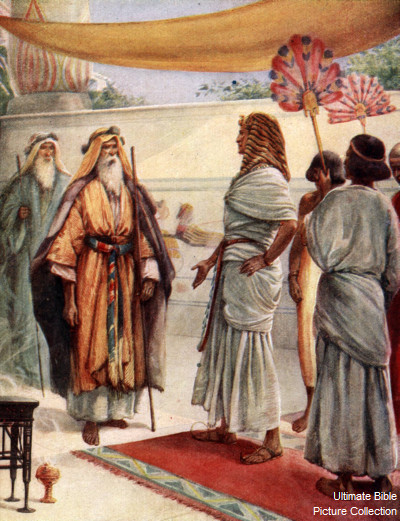 |
| Moses and Aaron confront Pharaoh |
'Tongue-tied' is also a common expression referring to one who is overly quiet and reluctant to speak out. This might be a result of nothing more than shyness, or it might indicate some disorder such as stuttering or dyslexia. Being mildly dyslexic myself, I certainly sympathize with those who keep quiet for this reason and have often done so myself.
In this week's Torah reading, Parashat Va-era, in the last verse of Exodus chapter six, we read Moses' complaint to Hashem: הן אני ערל שפתיים ואיך ישמע אלי פרעה - Look, I am of impeded speech, so how will Pharaoh listen to me??! This is in response to G-d's charge that Moses go to Pharaoh and relay His command: Let My people go!
'Impeded speech' is the way that most translations of the Torah seem to render the Hebrew aral sefatayim. But at least two translations - The Jerusalem Bible, published in Israel by Koren, and The Torah - a Modern Commentary, published in the USA by the URJ Press - translate the phrase as 'tongue-tied.' Does the mean the translators and editors think that Moses manifested Ankyloglossia, or that he was 'tongue-tied' in the more coloquial sense? Most likely the latter, and in fact a number of commentators opined that Moses was a stutterer. Stuttering is a difficult condition to overcome, and all stutterers know the pain of watching those listening to them speak, lose their patience with the stutterer's halting way of getting a point across. But whatever Moses' condition really was, Hashem had an elegant solution: Aaron, Moses' older brother would accompany him to confront Pharaoh, Moses would speak to Aaron, and Aaron would in turn speak to Pharaoh.
What G-d was really saying, is that a speech impediment - whatever it was specifically in Moses' case - is not a disqualification for leadership. This, despite that an important part of a leader's role is to clearly communicate to those he leads as well as others. There is always a work-around. There is more to being a leader, than being able to speak eloquently.
I think this is an important point. Eloquence of speech alone is not enough qualification to be a leader. There are lots of smooth talkers around whom one should not even consider following. And in the same vein, not being eloquent is probably disqualifying for being a Hollywood actor, but should not be considered disqualifying for leadership. Those called to lead, who aren't the greatest orators or the most clear oral communicators, should not shy away from leadership as Moses tried to. And let's expand the idea to include all manner of conditions that one might consider limiting, but which do not reflect character flaws that would disqualify one from leadership. Rather, they should find the work-around that allows them to follow their calling. Because after all, there is no shortage of individuals who can speak eloquently. On the other hand. true leaders are regrettably rare.







